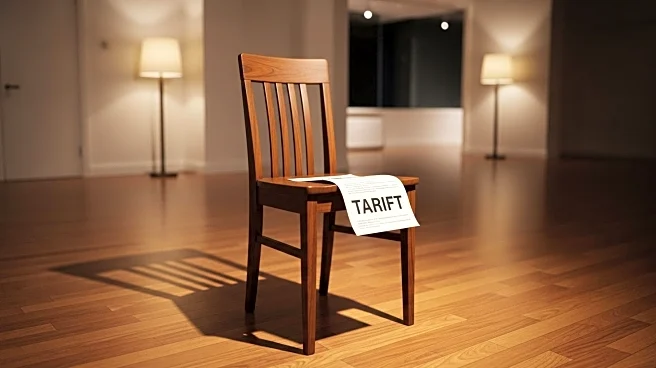What's Happening?
President Trump has introduced new tariffs on imported furniture, aiming to revitalize the North Carolina furniture industry, which has seen a decline in local production due to global supply chains. The tariffs, which include a 25% increase on imported kitchen cabinets, sinks, and veneered wooden furniture, are set to rise further in January. While some manufacturers may benefit from a more protected market, industry leaders like Alex Shuford, CEO of Rock House Farm Furniture, warn of potential negative impacts. Shuford highlights concerns about unintended consequences for firms with thin margins and a shortage of skilled labor. The tariffs could lead to higher prices for consumers and financial risks for suppliers dependent on imports.
Why It's Important?
The introduction of tariffs by President Trump is significant as it attempts to boost domestic furniture production and job creation in North Carolina, a state historically known for its furniture manufacturing. However, the policy could have mixed effects. While it may protect some local manufacturers, it could also lead to increased costs for consumers and financial strain on companies reliant on imports. The shortage of skilled labor in the U.S. further complicates the potential for a full revival of the industry. The tariffs may not only affect the local economy but also impact the broader U.S. furniture market, potentially leading to higher prices and reduced competitiveness.
What's Next?
As the tariffs increase in January, stakeholders in the furniture industry will need to adapt to the changing economic landscape. Companies may face challenges in balancing domestic production with import dependencies. The industry will likely need to invest in developing skilled labor and modernizing production processes to mitigate the impact of tariffs. Retailers and distributors will play a crucial role in navigating these changes, as they are essential in maintaining the industry's supply chain. The long-term effects on consumer prices and industry stability will require careful monitoring and strategic planning.
Beyond the Headlines
The tariffs could have broader implications for the U.S. economy, affecting consumer spending and inflation rates. The furniture industry, with its tight profit margins, may struggle to absorb increased costs, potentially leading to job losses and reduced investment in innovation. The policy also raises questions about the sustainability of protectionist measures in a globalized market, where international competition and supply chain dynamics are critical. The focus on reviving traditional industries may need to be balanced with efforts to foster new sectors and technologies.









